Expand the sections below to explore our Fall 2023 course descriptions.
Undergraduate Courses
 CAS AH111 – Pyramids to Cathedrals: An Introduction to Ancient and Medieval Art
CAS AH111 – Pyramids to Cathedrals: An Introduction to Ancient and Medieval Art
A chronological examination of the fundamentals of art and architectural history, this course introduces students to major monuments and works of art from antiquity to the Middle Ages in their social, religious and historical contexts.
Effective Fall 2018, this course fulfills a single unit in each of the following BU Hub areas: Aesthetic Exploration, Historical Consciousness.
T, R 11:00 – 12:15 Martin / Sloutsky
plus a discussion section – see registrar listings for section times
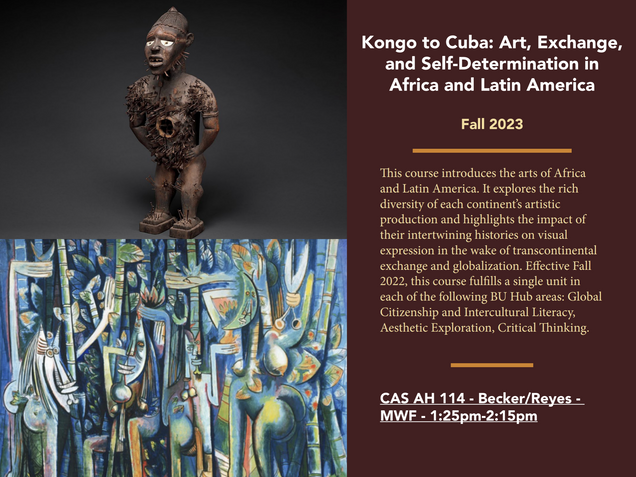 CAS AH114 – Kongo to Cuba: Art, Exchange, and Self-Determination
CAS AH114 – Kongo to Cuba: Art, Exchange, and Self-Determination
This course introduces the arts of Africa and Latin America. It explores the rich diversity of each continent’s artistic production and highlights the impact of their intertwining histories on visual expression in the wake of transcontinental exchange and globalization.
Effective Fall 2022, this course fulfills a single unit in each of the following BU Hub areas: Global Citizenship and Intercultural Literacy, Aesthetic Exploration, Critical Thinking.
M, W, F 1:25 – 2:15 Becker/Reyes
plus a discussion section – see registrar listings for section times
 CAS AH210 – Learning to See
CAS AH210 – Learning to See
Strengthens your ability to describe and analyze the visual world. From fundamentals such as color and composition to the design of advertisements, propaganda, and appliances. A lab component provides opportunities for direct engagement with objects, images, and the built environment.
Effective Fall 2018, this course fulfills a single unit in each of the following BU Hub areas: Aesthetic Exploration, Historical Consciousness, Critical Thinking
M, W, F 9:05 – 9:55 Ribner
plus a discussion section – see registrar listings for section times
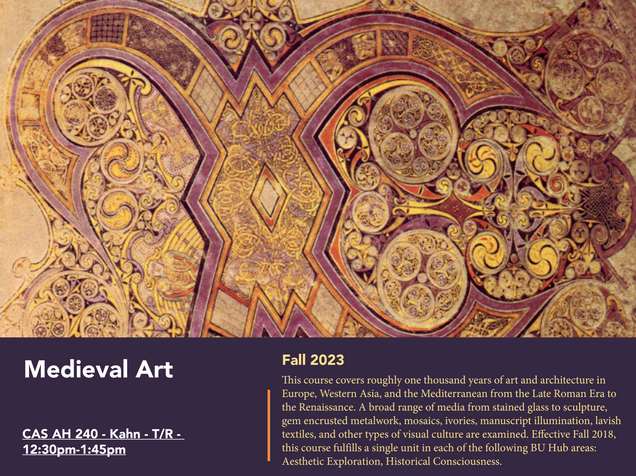 CAS AH240 – Medieval Art in Europe
CAS AH240 – Medieval Art in Europe
This course covers roughly one thousand years of art and architecture in Europe, Western Asia, and the Mediterranean from the Late Roman Era to the Renaissance. A broad range of media from stained glass to sculpture, gem encrusted metalwork, mosaics, ivories, manuscript illumination, lavish textiles, and other types of visual culture are examined.
Effective Fall 2018, this course fulfills a single unit in each of the following BU Hub areas: Aesthetic Exploration, Historical Consciousness.
T, R 12:30 – 1:45 Kahn
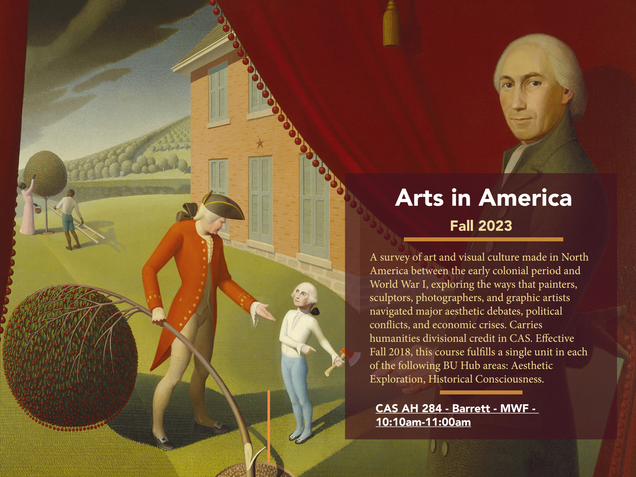 CAS AH284 – Arts in America
CAS AH284 – Arts in America
A survey of art and visual culture made in North America between the early colonial period and World War I, exploring the ways that painters, sculptors, photographers, and graphic artists navigated major aesthetic debates, political conflicts, and economic crises. Carries humanities divisional credit in CAS.
Effective Fall 2018, this course fulfills a single unit in each of the following BU Hub areas: Aesthetic Exploration, Historical Consciousness.
M, W, F 10:10 – 11:00 Barrett
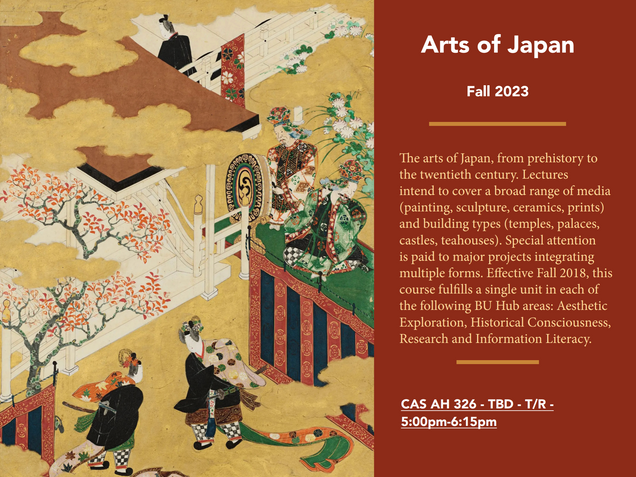 CAS AH326 – Arts of Japan
CAS AH326 – Arts of Japan
The arts of Japan, from prehistory to the twentieth century. Lectures intend to cover a broad range of media (painting, sculpture, ceramics, prints) and building types (temples, palaces, castles, teahouses). Special attention is paid to major projects integrating multiple forms.
Effective Fall 2018, this course fulfills a single unit in each of the following BU Hub areas: Aesthetic Exploration, Historical Consciousness, Research and Information Literacy.
T, R 5:00 – 6:15 Saunders
 CAS AH327 – Arts of China
CAS AH327 – Arts of China
Explores major works of Chinese art, from bronze vessels, Buddhist caves, ink painting, to contemporary performance. Addresses topics such as constructions of monumentality, cultural exchange, displays of power, literati identity, feminine space, and quests for modernization.
Effective Fall 2020, this course fulfills a single unit in each of the following BU Hub areas: Global Citizenship and Intercultural Literacy, Aesthetic Exploration, Research and Information Literacy.
M, W, F 10:10 – 11:00 Feng
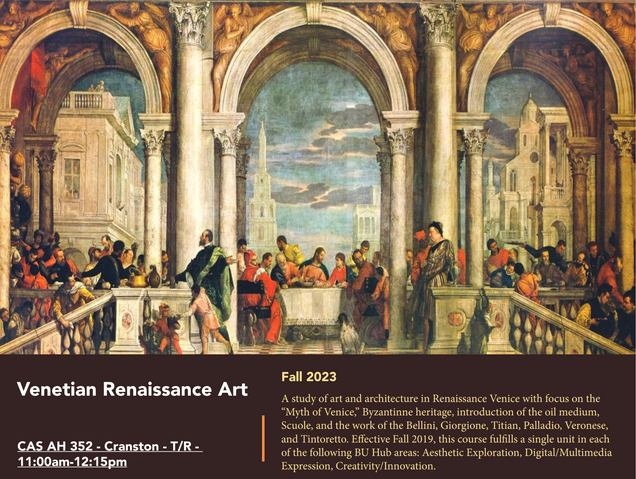 CAS AH352 – Venetian Renaissance Art
CAS AH352 – Venetian Renaissance Art
A study of art and architecture in Renaissance Venice with focus on the “Myth of Venice,” Byzantinne heritage, introduction of the oil medium, Scuole, and the work of the Bellini, Giorgione, Titian, Palladio, Veronese, and Tintoretto.
Effective Fall 2019, this course fulfills a single unit in each of the following BU Hub areas: Aesthetic Exploration, Digital/Multimedia Expression, Creativity/Innovation.
T, R 11:00-12:15 Cranston
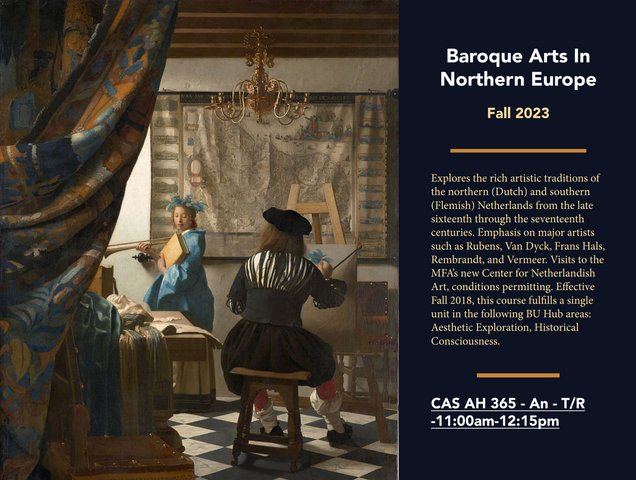 CAS AH365 – Baroque Arts in Northern Europe
CAS AH365 – Baroque Arts in Northern Europe
Explores the rich artistic traditions of the northern (Dutch) and southern (Flemish) Netherlands from the late sixteenth through the seventeenth centuries. Emphasis on major artists such as Rubens, Van Dyck, Frans Hals, Rembrandt, and Vermeer. Visits to the MFA’s new Center for Netherlandish Art, conditions permitting.
Effective Fall 2018, this course fulfills a single unit in the following BU Hub areas: Aesthetic Exploration, Historical Consciousness.
T, R 11:00-12:15 An
Things populate our everyday lives, and too often they are overlooked and unremarked. This course invites students to think about the world, the U.S., and their communities with an ordinary
thing: pie. Sweet or savory, appetizer, entrée, or dessert, pie provides an exceptional opportunity to trace an American commonplace through its constitutive elements—recipes, ingredients, creative acts of making, and the critical act of eating. The class organizes itself around pie as an idea, object, and pathway to offer an intensive introduction to theories and practices of material culture.
The course is organized around three core themes: (1) The Idea of Pie, (2) Creativity and Construction, and (3) The Worlds We Eat. We begin with the pie itself as a unit to introduce thinking with and through things, food, and the particularities of pie. We orient ourselves to thinking with things and develop our scholarly theoretical toolkits to better discuss pie and its constituent parts. The second unit delves concretely into the construction of pies and the knowledges they require of their makers. The final unit, “The Worlds We Eat” explores what it means to ingest a thing and its history into the self in the act of eating. This unit plays with consumption on multiple registers to challenge students to imagine themselves as part of national and global food systems in the past and present.
T, R 2:00-3:15 Bunschoten
 CAS AH385 – American Buildings and Landscapes
CAS AH385 – American Buildings and Landscapes
An introductory analytic survey of American buildings and landscapes within their historical and cultural contexts. Students examine forces that have shaped the American built environment. Topics range from Indian mounds to commercial strips, Spanish missions to skyscrapers.
Also offered as CAS AM 385.
T, R 12:30-1:45 Moore
 CAS AH391 – Twentieth-Century Art to 1940
CAS AH391 – Twentieth-Century Art to 1940
A study of the key tendencies in European art between the 1880s and World War II. The work of van Gogh, Picasso, Matisse, Dali, and their contemporaries is examined in relation to major issues in European culture and politics.
Effective Fall 2018, this course fulfills a single unit in each of the following BU Hub areas: Aesthetic Exploration, Historical Consciousness, Research and Information Literacy.
M, W, F 2:30-3:20 Sichel
 CAS AH393 – Contemporary Art: 1980 to Now
CAS AH393 – Contemporary Art: 1980 to Now
Explores the terms of debate, key figures, and primary sites for the production and reception of contemporary art on a global scale since 1980. Painting, installation art, new media, performance, art criticism, and curatorial practice are discussed.
Effective Fall 2018, this course fulfills a single unit in each of the following BU Hub areas: Aesthetic Exploration, Historical Consciousness.
T, R 3:30-4:45 Williams
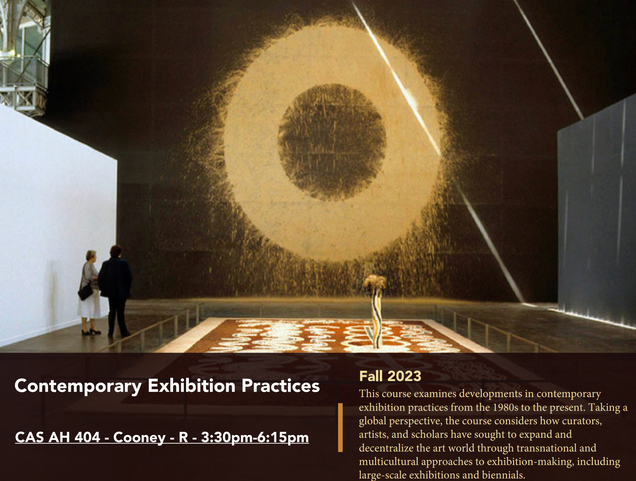 CAS AH404 – Topics in Museum Exhibits
CAS AH404 – Topics in Museum Exhibits
Topic for Fall 2023: Contemporary Exhibition Practices.
This course examines developments in contemporary exhibition practices from the 1980s to the present. Taking a global perspective, the course considers how curators, artists, and scholars have sought to expand and decentralize the art world through transnational and multicultural approaches to exhibition-making, including large-scale exhibitions and biennials.
R 3:30-6:15 Cooney
Seminars for Undergraduate & Graduate Students
 CAS AH500 A1 – Topics: History of Art & Architecture
CAS AH500 A1 – Topics: History of Art & Architecture
Topic for Fall 2023: A Global History of Camps: From the 19th Century to the Present.
The image of the camp dominates most visual representations of refugees in our contemporary world. This course will look into this seemingly ahistorical and technical humanitarian device from a global historical perspective. It will trace a genealogy of contemporary forms of refugee camps that begins with 19th-century plague and famine camps in British colonies, concentration camps in Cuba, South Africa, and the Philippines, WWII Nazi concentration camps and Soviet gulags, and then moves to U.S. incarceration camps, internment camps, and detention camps. In this course, the notion of ‘camp’ is understood in its broadest meaning and will include all forms of relocation sites, even summer camps and campsites for those displaced by natural disasters. This course will conclude with contemporary refugee camps in the Middle East, Africa, and Europe. We will look at—and sometimes fabricate—architectural plans, maps, medical reports, and archival images alongside reading the works of political theorists, historians, anthropologists, architects, and journalists who have attempted to historicize and theorize the camp.
M 2:30-5:15 Alnajada
 CAS AH500 B1 – Topics: History of Art & Architecture
CAS AH500 B1 – Topics: History of Art & Architecture
Topic for Fall 2023: Images and Power Relations in Latin America.
This seminar studies the role images have played in Latin American power relations since the conquest. It interrogates the power of images in constituting as well as challenging colonial, gender, racial, national, and modern identities. Images have been solicited in power negotiations since Columbus and the Caribbean peoples resorted to them for lack of a common spoken language. Central to understanding Latin American history is the production, translation, and reception (misrecognition) of images. Images have been enlisted for domination, diplomacy, and the constitution of subjectivities. The course focuses on the discourses surrounding: idoloclasty and iconophilia; the gendered and racial components of colonial hierarchies including the caste social structure; the articulation of the nation through gender (patriarchy), race (criollismo, indigenismo and afro-latinidad), as well as universalism and progress (modernity and development) alongside instances where images and cultural producers contest these normative constructs.
W 2:30-5:15 Reyes
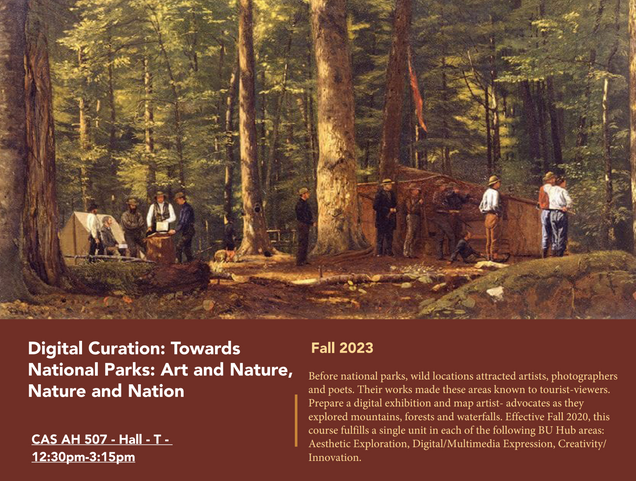 CAS AH507 – Digital Curation: Towards National Parks: Art and Nature, Nature and Nation
CAS AH507 – Digital Curation: Towards National Parks: Art and Nature, Nature and Nation
Before national parks, wild locations attracted artists, photographers and poets. Their works made these areas known to tourist-viewers. Prepare a digital exhibition and map artist- advocates as they explored mountains, forests and waterfalls.
Effective Fall 2020, this course fulfills a single unit in each of the following BU Hub areas: Aesthetic Exploration, Digital/Multimedia Expression, Creativity/Innovation.
T 12:30-3:15 Hall
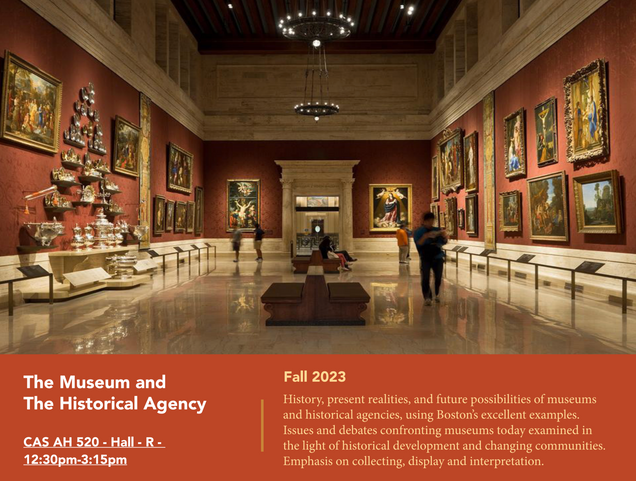 CAS AH520 – The Museum and The Historical Agency
CAS AH520 – The Museum and The Historical Agency
History, present realities, and future possibilities of museums and historical agencies, using Boston’s excellent examples. Issues and debates confronting museums today examined in the light of historical development and changing communities. Emphasis on collecting, display and interpretation.
R 12:30-3:15 Hall
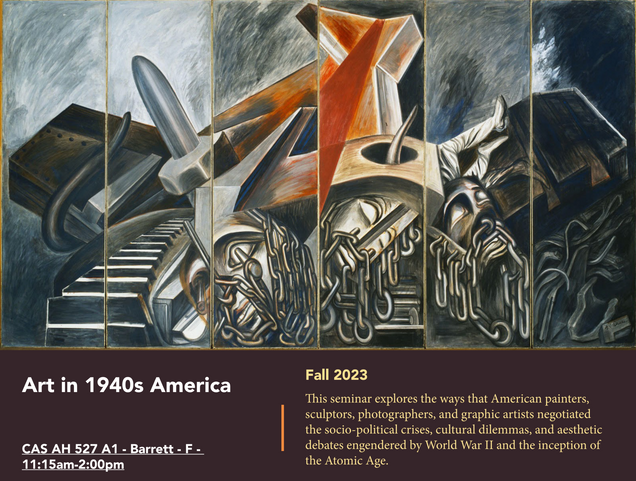 CAS AH527 A1 – Art & Society
CAS AH527 A1 – Art & Society
Topic for Fall 2023: Art in 1940s America.
This seminar explores the ways that American painters, sculptors, photographers, and graphic artists negotiated the socio-political crises, cultural dilemmas, and aesthetic debates engendered by World War II and the inception of the Atomic Age.
F 11:15-2:00 Barrett
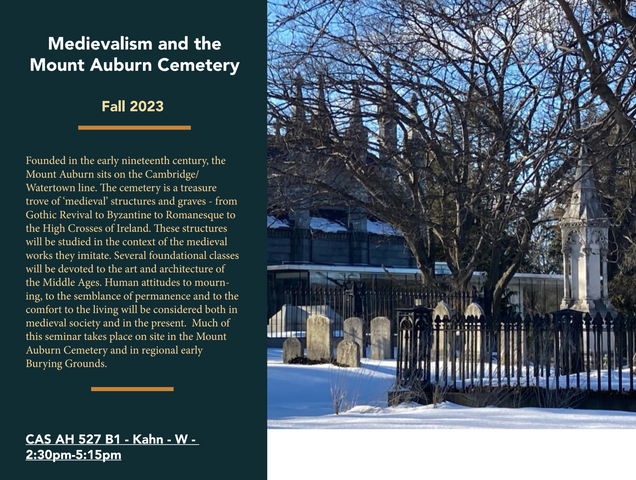 CAS AH527 B1 – Art & Society
CAS AH527 B1 – Art & Society
Topic for Fall 2023: The Mount Auburn Cemetery.
Founded in the early nineteeth century, the Mount Auburn sits on the Cambridge / Watertown line. The cemetery is a treasure trove of ‘medieval’ structures and graves – from gothic revival to Byzantine to Romanesque to the High Crosses of Ireland. These structures will be studied in the context of the medieval works they imitate. Several foundational classes will be devoted to the art and architecture of the Middle Ages. Human attitudes to mourning, to the semblance of performance, and to the comfort of the living will be considered both in medieval society and in the present.
Note: Much of this seminar takes place on site in the mount Auburn cemetery and in regional early burial grounds.
W 2:30-5:15 Kahn
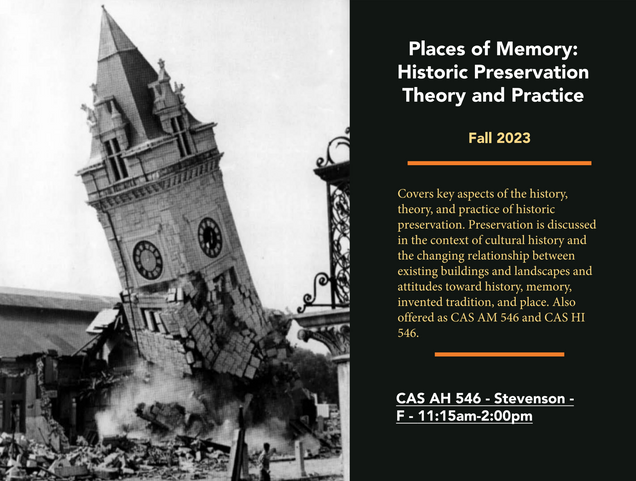 CAS AH546: Places of Memory: Historic Preservation Theory and Practice
CAS AH546: Places of Memory: Historic Preservation Theory and Practice
Covers key aspects of the history, theory, and practice of historic preservation. Preservation is discussed in the context of cultural history and the changing relationship between existing buildings and landscapes and attitudes toward history, memory, invented tradition, and place. Also offered as CAS AM 546 and CAS HI 546.
F 11:15-2:00 Stevenson
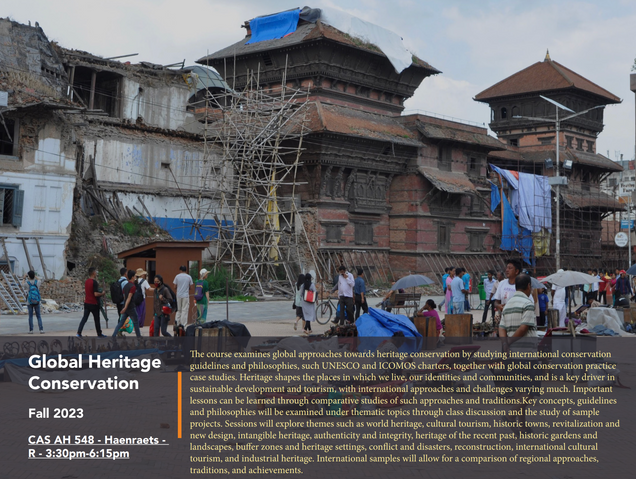 CAS AH548 – Global Heritage Conservation
CAS AH548 – Global Heritage Conservation
Examining global approaches towards heritage conservation through a study of concepts, charters and case studies, using themes such as world heritage, cultural tourism, historic towns, new design, intangible heritage, authenticity, integrity, recent past, historic landscapes, conflict, disasters, revitalization and reconstruction.
R 3:30-6:15 Haenraets
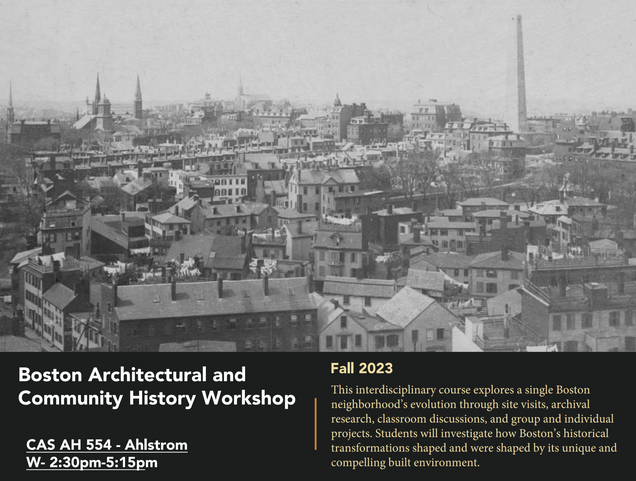 CAS AH554 – Boston Architectural and Community Workshop
CAS AH554 – Boston Architectural and Community Workshop
This interdisciplinary course explores a single Boston neighborhood’s evolution through site visits, archival research, classroom discussions, and group and individual projects. Students will investigate how Boston’s historical transformations shaped and were shaped by its unique and compelling built environment.
W 2:30-5:15 Ahlstrom
 CAS AH589 – Topics in Nineteenth-Century Art
CAS AH589 – Topics in Nineteenth-Century Art
Topic for Fall 2023: The Age of Napoleon.
The seminar addresses European art from the 1770s through the mid-nineteenth century, when artists were certain of nothing except — in the words of the poet John Keats — “the holiness of the heart’s affections and the truth of the imagination.”
R 8:00-10:45 Ribner
Graduate Courses
 GRS AH727 – Colloquium in Chinese Art
GRS AH727 – Colloquium in Chinese Art
This graduate-level colloquium will critically examine issues of Chinese art covered in AH327 Arts of China. Special attention will be given to recent scholarship that engages with Chinese art in a greater socio-cultural context.
Must attend MWF section with AH327.
M 2:30-4:15 Feng
 GRS AH791 – Twentieth-Century Painting and Sculpture
GRS AH791 – Twentieth-Century Painting and Sculpture
Topic for Fall 2023: Contemporary Art and Globalization.
Examines the work of artists, curators, and scholars who have commented on the rise of cultural globalization as the primary critical model for assessing contemporary art. In addition to weekly meetings, students attend lectures in AH393, “Contemporary Art: 1980 to Now,” thereby gaining a broad understanding of international developments in art of the past half century.
T 9:00-10:45 Williams
 GRS AH812 – Seminar: Portraiture
GRS AH812 – Seminar: Portraiture
Topic for Fall 2023: Picturing Race in Early Modern Europe, 1400-1700
This seminar traces a history of visual constructions of race and ethnicity in Europe through paintings, sculpture, prints, maps, and other forms of visual depiction of racial difference. One of the key questions the seminar will address is: How have images of racial difference been produced, circulated, and understood in different historical periods and according to western notions of beauty and the ideal?
R 9:00-10:45 Cranston
 GRS AH863 – Seminar: Baroque Art
GRS AH863 – Seminar: Baroque Art
Topic for Fall 2023 – A Golden Age? Global and Material Turns in the Study of Seventeenth-Century Dutch Art.
This seminar explores the so-called “Golden Age” of seventeenth-century Dutch art, with particular focus on the global and materiality studies approaches that have recently transformed the field. Classes are conducted at the MFA’s new Center for Netherlandish Art (CNA), established as part of a landmark 2017 gift of over 113 Dutch and Flemish paintings and other objects to the museum. CNA Director Christopher Atkins will co-teach the class, and we will have the opportunity to interact with MFA curators and conservators. Balancing engagement with the latest scholarship on Dutch art with object-based inquiry, we will work directly with the MFA’s outstanding collection of Dutch paintings, prints, drawings, and decorative arts, as well as explore the innovative reinstallation of the museum’s Dutch and Flemish galleries. One class is also be held at the Harvard Art Museums, which in 2017 received a transformative gift of over 330 seventeenth-century Dutch and Flemish drawings. Important themes for our discussions will include: Dutch art, global commerce, colonialism, and slavery; contemporary display practices and their reception; technical investigations and the materiality of Dutch art; the intersection of global and materiality studies; the art market, specialization, and artistic authority; and print culture and collecting in an early information age.
W 2:30-4:15 Zell
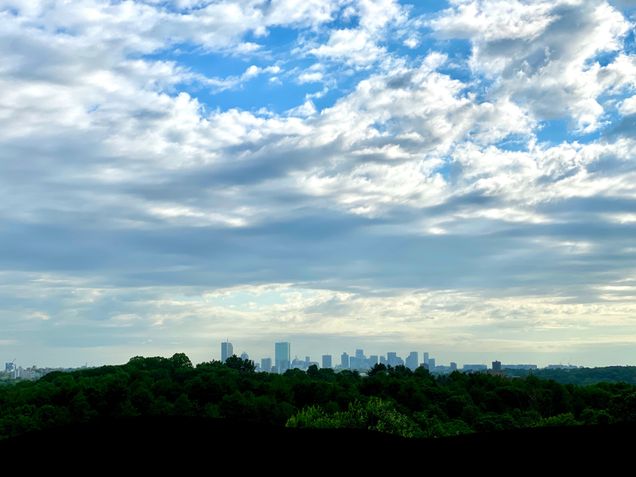 GRS AH867 – Material Culture
GRS AH867 – Material Culture
Introduction to the theory and practice of the interdisciplinary study of material culture, which includes everything we make and use, from food and clothing to art and buildings. Explores contemporary scholarship from a range of disciplines. Also offered as GRS AM 867.
T 3:30-6:15 Moore
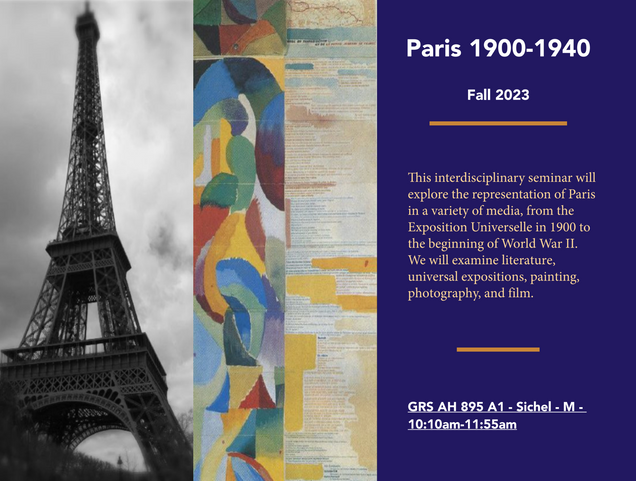 GRS AH895 A1 – Seminar: Twentieth-Century Art
GRS AH895 A1 – Seminar: Twentieth-Century Art
Topic for Fall 2023: Paris 1900-1940.
This interdisciplinary seminar will explore the representation of Paris in a variety of media, from the Exposition Universelle in 1900 to the beginning of World War II. We will examine literature, universal expositions, painting, photography, and film.
M 10:10am – 11:55am Sichel
Click here to view a poster gallery page of our Fall 2023 course posters.
Fall 2023 Registration Dates
Registration for Fall 2023 courses opens based on your academic class standing as follows:
| Academic Class Year: | Start Date: | Start Time (ET): |
| Graduate Students in CDS, COM, LAW, MET, SAR, SHA, SPH, SSW and STH | Sat, Apr 1 | 9:00 a.m. |
| Graduate Students in CFA, EGS, ENG, GRS, MED, QST, SDM and SED | Sun, Apr 2 | 9:00 a.m. |
| MET Evening Undergraduate Degree Students | Sun, Apr 16 | 9:00 a.m. |
| Seniors* | Sun, Apr 16 | 9:00 a.m. |
| Juniors* | Sun, Apr 16 | 12:00 p.m. |
| Sophomores* | Sun, Apr 23 | 9:00 a.m. |
| Continuing Freshmen* | Sun, Apr 23 | 9:00 a.m. |
| Non-Degree Students | Tue, Apr 25 | 9:00 a.m. |
*Undergraduate populations are divided into 10 groups by class year (in Fall 2022) and the last digit of the student ID number; see the Start Times charts here.
